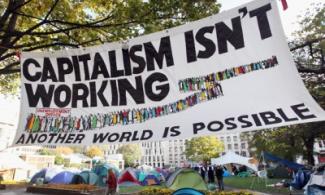California Passes Bill to Legalize Complementary Currencies
A community without dollars is not a community without wealth – this basic insight lies at the heart of the community resilience movement. With income and wealth inequality still on the rise in our “post-recession” economy, communities are finding creative ways to meet their needs and maintain social ties through community-created forms of exchange, or complementary currencies.

 Mention the commons and most people conjure up the image of a bucolic English pasture. The commons were the fields and forests where medieval commoners farmed, raised sheep, gathered firewood, and in other ways met their everyday needs. That was before aristocrats and landed gentry evicted millions of people from their traditional lands and began the large-scale, industrialized abuse of nature.
Mention the commons and most people conjure up the image of a bucolic English pasture. The commons were the fields and forests where medieval commoners farmed, raised sheep, gathered firewood, and in other ways met their everyday needs. That was before aristocrats and landed gentry evicted millions of people from their traditional lands and began the large-scale, industrialized abuse of nature. Though they end up as owners and decision-makers, workers in low-income communities often don't start off doing all the work of developing and growing a worker-owned cooperative themselves.
Though they end up as owners and decision-makers, workers in low-income communities often don't start off doing all the work of developing and growing a worker-owned cooperative themselves.
 If I let on that, here in Oakland, there is a graphic design business, a bakery, a design-build firm, a business incubator and a bicycle courier company that all have one very important similarity, what would you guess it is that they have in common? Say… you’re right: They are all worker-cooperatives. What a guess!
If I let on that, here in Oakland, there is a graphic design business, a bakery, a design-build firm, a business incubator and a bicycle courier company that all have one very important similarity, what would you guess it is that they have in common? Say… you’re right: They are all worker-cooperatives. What a guess! The expansion of crowdfunding in the last few years has been quite vertiginous. Hundreds of projects have been able to get off the ground around the world coming from very different backgrounds but united in the aim of creating a link between donors and the projects they sponsor. Crowdfunding, for its practicality and usefulness, has expanded without any ideological limitation and while it served to fin
The expansion of crowdfunding in the last few years has been quite vertiginous. Hundreds of projects have been able to get off the ground around the world coming from very different backgrounds but united in the aim of creating a link between donors and the projects they sponsor. Crowdfunding, for its practicality and usefulness, has expanded without any ideological limitation and while it served to fin

 One of the biggest barriers to making investments in energy efficiency and renewable energy is the upfront cost. So what if members of rural electric cooperative and rural municipal electric utilities could borrow money for small-scale improvements on the same terms as the utilities for their large-scale power plants?
One of the biggest barriers to making investments in energy efficiency and renewable energy is the upfront cost. So what if members of rural electric cooperative and rural municipal electric utilities could borrow money for small-scale improvements on the same terms as the utilities for their large-scale power plants?
 A survey about food availability downtown is ready for residents to take on the city website.
A survey about food availability downtown is ready for residents to take on the city website. Given our national economic climate and the growing recognition of collaborative, place-based and culturally-grounded approaches, it is only fitting then that the theme of the
Given our national economic climate and the growing recognition of collaborative, place-based and culturally-grounded approaches, it is only fitting then that the theme of the  Everyone is equal at New Era Windows Cooperative, a factory on the southwest side of Chicago. There is no owner to answer to because everyone is an owner; there are no outside shareholders to choose a board of directors. There is no boss because the workers fired him.
Everyone is equal at New Era Windows Cooperative, a factory on the southwest side of Chicago. There is no owner to answer to because everyone is an owner; there are no outside shareholders to choose a board of directors. There is no boss because the workers fired him.
 A wide variety of co-operative support organisations are starting to come together with help from national co-op body
A wide variety of co-operative support organisations are starting to come together with help from national co-op body